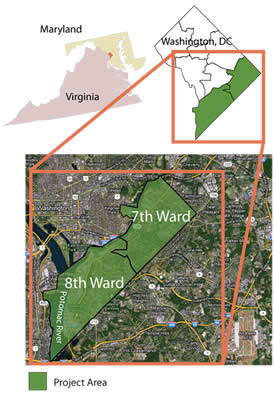Region 3 EJ Showcase Community: Washington, DC Wards 7 and 8
Grants & Programs Topics
EJ Showcase Communities by Region
Overview
EPA Region 3 is building on its Environmental Justice work with a variety of partners, such as: the District Department of Environment; the District Department of Health; and, local recipients of Environmental Justice Collaborative Problem Solving and Environmental Justice Small Grant awards.
Successes
- Facilitated and funded a green infrastructure job training project in southeast DC.
- Created a community consensus statement on contaminated properties.
- Convened three major workgroups with stakeholder groups around the District to address community needs.
- Supported three consensus building meetings held by the Children’s Environmental Health Workgroup (CEHW).
- Leveraged EPA funding for the CEHW Healthy Homes Project.
History

The Region established an initial stakeholder working group made up of EPA Region III, members of the District of Columbia Environmental Health Collaborative coordinated by the Coalition for Environmentally Safe Communities (CESC) and the Children’s Environmental Health Network (with as many as 40 organizations), and the District of Columbia Department of the Environment.
The project is working in communities that exhibit characteristics common to neighborhoods suffering from environmental injustices including poverty, high ethnic minority populations, degraded infrastructure, poor access to environmental and other amenities, high asthma rates, child lead exposure, and so on. Region 3 has forged connections with:
- the District’s Department of Environment (DDOE) and Department of Health;
- the U.S. Department of Interior (including National Park Service and Fish and Wildlife Service);
- the Department of Labor; and
- numerous other agencies, non-governmental groups, and community organizations within the District.
The first phase of data gathering for the project has been completed. The data report was presented to the public on March 20, 2010. The issues and concerns identified in the report and through forum interactions with the community identify lead asthma, children’s health, and hazardous facilities as concerns. In addition, forum participants were also concerned with pesticides, subsistence fishing, children’s health, day care centers, vehicle idling, and green jobs/green economy.
The planning committee compiled all of the information gathered and developed a listing of critical issues:
- Green Economy/Green Jobs,
- Children’s Environmental Health, and
- Contaminated Properties.
The three work groups held stakeholder meetings throughout the fall and winter, developing action plans for their projects.
The Showcase Communities Project can already point to several successes, such as facilitating the development, funding and implementation of a green jobs project in Southeast Washington, DC. The project built community capacity on green infrastructure best management practices and Brownfields revitalization. The partners will deliver green infrastructure training to 250 Job Corps Center construction trade students, install demonstration rain-harvesting technologies and hold community workshops.
The Green Economy Workgroup formed a committee under and facilitated a partnership between member NGOs and DDOE. This effort will provide a local pool of trained cleanup workers to address many of the contaminated sites within the District.
The Children’s Environmental Health Workgroup developed the following project with its stakeholders. The goal of this project is to launch a comprehensive healthy homes, healthy schools and healthy child care program that will address multiple environmental health and safety hazards in Ward 8 in the District of Columbia.
The Contaminated Properties Workgroup is developing an informational community forum regarding contaminated sites in the District of Columbia, with the goal of supporting education and advocacy, and fostering environmental stewardship amongst the community. The group is looking to hold a broad based stakeholder forum. For more information or to become involved, please contact Reginald Harris (harris.reggie@epa.gov) at 215-814-2988.
![[logo] US EPA](../gif/logo_epaseal.gif)